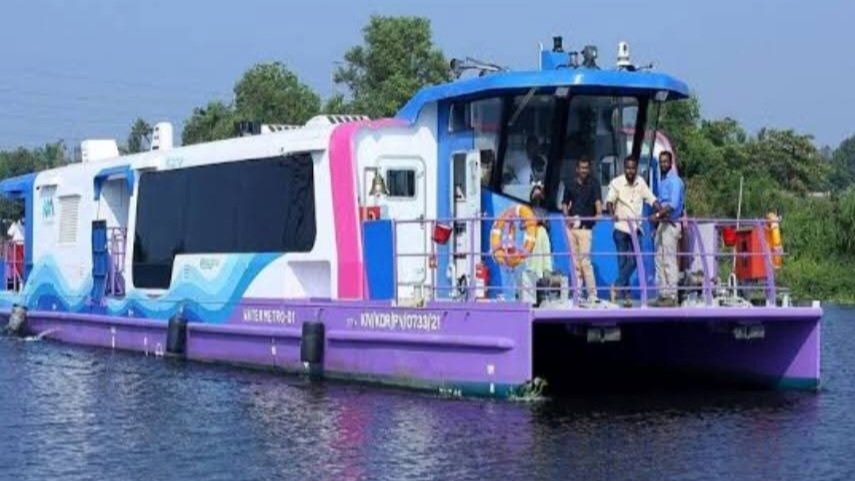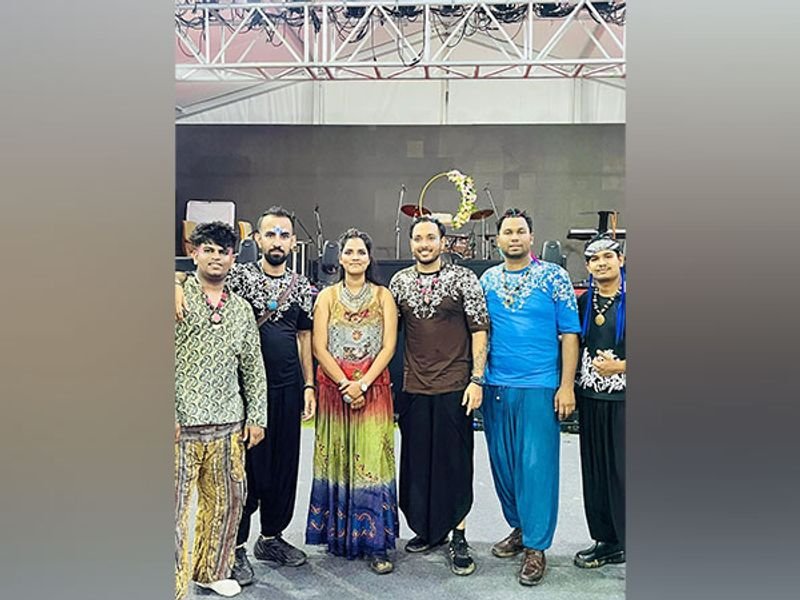Spiritual Travel
Ramada Plaza by Wyndham Ayodhya Masodha Set to Redefine Spiritual Luxury Hospitality with World-Class Amenities in the Heart of a Growing Pilgrimage and Cultural Destination in Uttar Pradesh, India

Saturday, July 19, 2025
A New Era in Ayodhya’s Spiritual Tourism
A transformative hospitality project is taking shape in Ayodhya, a city deeply rooted in spiritual and cultural legacy. Plans have been unveiled for the development of a luxury hotel, aiming to redefine the travel experience for both domestic and international visitors. The upcoming property, named the Ramada Plaza by Wyndham Ayodhya Masodha, represents a major leap forward in Ayodhya’s journey toward becoming a world-class religious tourism destination.
Set for completion in 2028, this greenfield development is currently moving through its final planning stages. It promises to bring a new dimension to the city’s hospitality sector by combining modern comfort with cultural authenticity.
Located in Masodha, a strategically significant area within the city, the hotel will feature 120 well-appointed guest rooms and a wide array of upscale amenities designed to offer a comprehensive and memorable stay.
Blending Comfort with Sacred Traditions
What sets this hotel apart is its goal to provide more than just a place to rest. It aims to offer a complete hospitality journey that respects the religious essence of Ayodhya while appealing to today’s discerning travelers.
Guests can look forward to:
- A multi-cuisine, all-day dining restaurant
- Spacious banquet and conference halls
- A serene spa for relaxation
- A swimming pool and additional leisure facilities
- Personalized services for business and leisure travelers
The project aspires to set a new benchmark for regional hospitality—one that honors tradition while delivering world-class quality. With its modern features and culturally sensitive design, the hotel will meet the expectations of both pilgrims and global tourists.
Ayodhya’s Rapid Growth as a Spiritual and Cultural Hub
Widely acknowledged as the birthplace of Lord Ram, Ayodhya holds a profound place in the hearts of millions. Over the years, the city has seen a remarkable shift, evolving from a traditional pilgrimage site into one of India’s fastest-growing religious tourism centers.
This transformation is being propelled by major infrastructure developments. The government has launched numerous projects aimed at revamping the city’s roads, riverfronts, and eco-tourism zones. Central to these upgrades is the Maharishi Valmiki International Airport, which has significantly boosted regional and global connectivity.
With enhanced transportation networks, including new highways and improved rail links, Ayodhya is now more accessible than ever, drawing not just religious travelers but also those interested in heritage and cultural exploration.
Investing in the Future of Tier-II and Tier-III Cities
The decision to build a second luxury hotel in Ayodhya signals strong confidence in the city’s potential. It also reflects a broader trend within the hospitality sector—investing in emerging destinations outside traditional metropolitan areas.
Tier-II and Tier-III cities, especially those with spiritual and historical importance, are now at the forefront of India’s tourism boom. The new hotel in Masodha is part of a strategic move to meet the rising demand for premium lodging in such cities.
By offering luxury services in culturally significant locations, the hospitality industry is tapping into a fast-evolving market of travelers who seek depth and meaning in their journeys without sacrificing comfort.
A Global Shift in Religious Travel
The upcoming development in Ayodhya symbolizes a larger shift in the way religious destinations are viewed globally. Traditionally, such places were associated with minimal infrastructure and basic accommodations. That perception is changing.
As spiritual travel becomes more mainstream, particularly among international visitors, there is a growing expectation for better amenities, safer environments, and enriched cultural experiences. The new hotel addresses these needs directly, bridging the gap between tradition and modern hospitality.
This evolution is expected to:
- Extend average visitor stays
- Increase tourist spending in the local economy
- Enhance the overall travel experience
- Attract a broader audience interested in history, architecture, and spirituality
Strategic Highlights of the Hotel Project
Some key aspects of the planned hotel include:
- A total of 120 guest rooms designed for comfort and elegance
- A location in Masodha, an area with growing importance in Ayodhya’s tourism framework
- Facilities such as banquet halls, spa, restaurant, and recreation zones
- An overall design concept that merges contemporary standards with religious reverence
- Strong transport links through Maharishi Valmiki International Airport, roadways, and railway access
These elements position the hotel as a landmark project not only for Ayodhya but for India’s evolving tourism model.
Transforming the Pilgrim Experience
Perhaps the most significant outcome of this project is the way it promises to enhance the experience of visiting Ayodhya. For many, coming to this sacred city is more than a trip—it’s a deeply personal, spiritual journey. Having access to high-quality lodging will allow pilgrims to reflect, rest, and rejuvenate during their visit.
This shift could have a profound influence on how people view religious tourism. By making the experience comfortable and seamless, it opens the door for new demographics—families, international travelers, elderly visitors, and those seeking cultural immersion—to engage with Ayodhya’s timeless heritage.
Looking Toward 2028 and Beyond
By the time this landmark hotel opens its doors in 2028, Ayodhya is likely to be standing tall on the global tourism map. With a unique blend of faith, history, and hospitality, the city is set to become a leading destination for spiritual travel.
The development also signals what’s next for India’s tourism sector: a future that embraces the spiritual heart of the country, offers modern infrastructure, and delivers unforgettable experiences to all who visit.
This project is more than just a hotel—it is a symbol of growth, respect for tradition, and a confident step into the future of how the world sees Ayodhya.
Spiritual Travel
7 Quiet Corners of Coimbatore That’ll Make You Forget The World Exists

From tranquil gardens to serene temples, these 7 calming locations across Coimbatore offer the perfect escape from city chaos. Whether you’re meditating, journaling, or just being still, these mindful havens help you find peace in the present.
The southern Indian location Coimbatore serves as both an industrial education center and provides locations where people can practice mindfulness and self-reflection. The bustling streets of Coimbatore lead residents to various tranquil preserves that allow them to discover peace while they practice mindfulness. The following list presents the prime locations in Coimbatore where visitors and residents can practice mindfulness.
1. Marudamalai Temple
Marudamalai Temple exists in the Western Ghats foothills as a Hindu temple that honors Lord Murugan. The temple rests on a hilltop where people can find tranquility because its position offers panoramic views across the entire environment that helps mindfulness and meditation practices. The temple is accessible through 450 steps where undertaking the stair climbing serves as a special mindfulness routine. You can find both peace and serenity at this location through its calm atmosphere together with its ritualistic music and spiritual practices that help you stay present.
2. Siruvani Waterfalls
Siruvani Waterfalls stands as a beautiful and clear cascades that ranks as a major scenic attraction close to Coimbatore. This serene site lies in a forested area next to hill slopes that provide visitors a haven from city distractions. At this location the mixture of flowing water sounds with bird chirping serves as the perfect natural background for deep breathing along with grounding techniques for mindfulness. The observation of water movement at the falls enables individuals to develop awareness and thankful appreciation of natural wonders.
3. Velliangiri Hills (Sacred Seven Hills)
Velliangiri Hills close to Coimbatore establish profound spiritual importance because numerous people respect them as holy locations. According to Tamil tradition Siddhar Agastya settled on these hills which people believe are his sacred dwelling. Tourists seeking spirituality and wisdom walk through these hills where they receive spiritual power from their environment. Exploring these paths allows individuals to examine their inner selves while standing on top brings breathtaking views that foster composed awareness.
4. ISKCON Temple
Visitors find peace in the International Society for Krishna Consciousness (ISKCON) temple located in Coimbatore. The temple’s devotional ambience and tasteful architecture enables guests to practice both prayer and mediation and devotional chanting activities. A visit to the ISKCON Temple includes participation in kirtans or peaceful garden meditation which creates an atmosphere of inner peacefulness and mindfulness. ISKCON teachings educate students to live consciously with harmony which matches exactly with mindfulness guidelines.
5. Perur Patteeswarar Temple
Throughout history the ancient Shiva temple has settled on the bank of Noyyal River while emitting pure divine serenity and historical charm. The temple complex spreads across diverse stone buildings which surround a tranquil tank allowing visitors to contemplate. Stepping barefoot on temple floors made of cool stone as well as relaxing under tree shade on temple grounds lets you spend time with your senses while finding peace. Visitors can experience mindful observation and traditional Indian craftsmanship appreciation at Perur Patteeswarar Temple because of its favorable environment.
6. Singanallur Lake
People seeking urban relaxation spaces in Coimbatore visit Singanallur Lake as a preferred destination. The revitalized waterbody functions as an attraction for both birdwatchers as well as jogging enthusiasts seeking relaxation together with families. The shallow mist enveloping the lake creates peaceful surroundings during early morning hours while offering a perfect environment to practice activities like yoga and tai chi along with journaling. Your connection to nature improves when you focus on both the range of bird species and the sounds produced by moving leaves while looking at an object in front of you.
7. Brookefields Mall Rooftop Garden
The unusual location of Brookefields Mall houses a rooftop garden which brings together modern spaces alongside relaxation areas. Shopping visitors at this green space can pause their activities to sit on the seating areas or walk across manicured lawns with flower beds while they reflect. The venue allows people to practice mindfulness while staying close to the central area of the city. Expert observers can recharge their minds by both deep breathing and gazing at the city skyline.
Why Choose Coimbatore for Mindfulness?
Coimbatore stands out as an exceptional spot for mindfulness seekers because it combines natural landmarks with cultural sites of worship and spiritual destinations. People seeking isolation or social practice can both find accessible retreats in Coimbatore while escaping the crowded environment of metropolitan cities. The position next to the Western Ghats offers clean air together with lovely views that improve the mindfulness experience.
The city promotes both wellbeing programs through its established yoga facilities and Ayurvedic spa services along with meditation programs which support mindful existence. Environmental conservation activities receive active community support because these natural treasures must last for generations to come.
Tips for Practicing Mindfulness in Coimbatore
You can find most outdoor locations empty during morning hours which will give you the chance to meditate undisturbed.
- Carrying water bottles as water is essential especially during explorations at Siruvani Waterfalls and Velliangiri Hills.
- Your respect for local customs should include following temple wear guidelines as well as sacred space conduct rules.
- Disengage your digital devices because complete absorption in your environment requires a break from electronic screens.
- Deepen your mindfulness session through sensory engagement which involves sight, sound , smell , touch and taste when it applies.
Conclusion
Coimbatore creates an excellent environment which combines natural landscapes with cultural attractions and spiritual places suitable for mindfulness development. Visitors can reconnect at Velliangiri Hills or Siruvani Falls and six other locations because these spaces offer different possibilities to discover personal reflection and renewal. You can experience transformation through mindfulness practices by incorporating this practice into your visits to these locations. Coimbatore extends friendly welcome to those who seek inner peace no matter their experience level in mindfulness practice.
Spiritual Travel
Bilaspur Set to Transform into Himachal’s Ultimate Adventure and Spiritual Hub

Move over, Manali and Shimla! Bilaspur is gearing up to become the state’s next big tourism hotspot, blending adrenaline-pumping adventures with serene spiritual experiences. The district administration has rolled out ambitious plans to develop water, land, and aerial tourism, promising something for thrill-seekers, pilgrims, and nature lovers alike.
A Sky-High Attraction: The Glass Bridge
Imagine walking on a transparent bridge, suspended high above breathtaking landscapes—Bilaspur’s upcoming Glass Bridge at Bharari will do just that! Designed to rival global attractions, this engineering marvel will offer daredevils an unforgettable experience while giving tourists a reason to extend their stay. Officials confirm the blueprint is ready, and construction will kick off soon after final approvals.
Sailing Through Scenic Routes: The Water Metro
Pilgrims visiting Maa Naina Devi will soon have a faster, more scenic journey thanks to the proposed Water Metro, connecting Bhakra Ghat to Kosariya Ghat. This isn’t just about convenience—it’s about turning travel into an experience. Devotees and tourists can hop on boats, enjoy the tranquil waters, and even transport their vehicles via waterways.
Jet Skis, Kayaking & More: Water Sports at Nakrana
Bhakra Dam’s pristine waters are about to get a lot more exciting! The district is eyeing water sports like jet skiing, kayaking, and boating to attract adventure junkies. The best part? Pilgrims heading to Naina Devi can now add a splash of adventure to their spiritual trip.
Bharari – The New Stopover Destination
Strategically located near Shimla, Manali, and Dharamshala, Bharari will soon feature modern tourist hubs with food plazas, parking, rest areas, and info centers. No more cramped pit stops—just smooth, comfortable breaks for travelers.
Listening to Locals: Boaters Get a Voice
Deputy Commissioner Rahul Kumar made sure local boat operators were heard during inspections, promising quick fixes to their concerns. This people-first approach ensures tourism growth benefits everyone.
Bilaspur’s transformation isn’t just about flashy infrastructure—it’s about jobs for youth, better travel experiences, and putting this hidden gem on India’s tourism radar. With projects set to launch soon, the district is poised to become a must-visit for those seeking adventure, spirituality, and untouched natural beauty.
Spiritual Travel
Shiva Tribe Debuts in Gurgaon’s Tikli-Raiseena: IMPC’s Bold Step to Merge Spirituality, Rural Tourism, and Modern Family Wellness

VMPL
New Delhi [India], August 4: In the lush rural landscape of Tikli-Raiseena near Gurgaon, a new chapter in India’s spiritual and rural tourism ecosystem quietly unfolded. The International Mandir Prabandhak Committee (IMPC) launched its ambitious spiritual wellness initiative–Shiva Tribe–an experience-driven, immersive space designed to reconnect Gen Z and modern families with India’s timeless spiritual roots.
Set against the tranquil backdrop of Haryana’s Aravalli fringes, Shiva Tribe is more than a mandir–it is a curated journey of self-discovery, holistic wellness, and cultural revival, seamlessly merging ancient wisdom with modern aspirations. The inaugural three-day Pran Pratishtha Mahotsav was held in July, graced by spiritual luminaries including Pujya Shri Sudhanshu Ji Maharaj, Pujya Shri Dayanand Ji Maharaj, and dignitaries such as Haryana’s former Minister Shri Om Prakash Dhankar. Business leaders, rural development advocates, and spiritual patrons attended in significant numbers–signaling a rising interest in faith-based tourism models.
Spiritual Tourism: India’s Growing Wellness Sector
India’s spiritual tourism market is undergoing a silent revolution. According to the Ministry of Tourism, the wellness and spiritual tourism segment is projected to reach USD 30 billion by 2028, growing at a CAGR of over 10%. With over 330 million domestic religious tourists recorded annually and rising international interest in authentic Indian experiences, initiatives like Shiva Tribe have the potential to create high-value, low-impact tourism models in rural belts–generating employment, fostering entrepreneurship, and revitalizing local economies.
“In today’s fragmented lifestyle, families are searching for meaningful escapes–not just vacations. Shiva Tribe is that sacred pause–a place to reconnect, reflect, and realign, together,” said Dr. Preet Sandhuu, mentor of the project and a key voice in India’s contemporary spiritual movement.
A New Blueprint: Spirituality Meets Community Living
Unlike traditional spiritual centers, Shiva Tribe offers a complete spiritual-eco retreat–including weekend live devotional music by its in-house ‘Shiva Tribe Band’, yoga sessions, mantra-infused meditations, Vedic rituals, and stay facilities for families. It’s a full-circle experience designed to inspire urban youth and families alike to step into a more conscious, value-driven lifestyle.
“Here, spirituality is not a sermon–it’s an experience,” said Shri MP Singh, project visionary and founder of ShivaTribe. “We want to build a network of such community-driven centers across rural India, using temple heritage as a catalyst for rural rejuvenation and youth engagement.”
Rural Regeneration Through Faith
The Tikli model aligns with India’s rural tourism policy goals by transforming underexplored rural regions into mindful tourism destinations. With over 60% of India’s population residing in villages, initiatives like this leverage India’s spiritual capital to promote rural entrepreneurship, handicrafts, organic farming, and ecotourism–creating a sustainable rural economy rooted in culture and community.
IMPC’s Broader Mission
The International Mandir Prabandhak Committee (IMPC), known for initiatives like the Mahasangam Yatra, Trisul Yatra and Shiv-Shakti Kendras, is rapidly becoming a bridge between India’s ancient temple traditions and its digital future. Its work focuses on temple modernization, spiritual leadership development, and community revival–backed by collaborations with scholars, saints, and civic leaders.
By anchoring the Shiva Tribe initiative in Tikli, IMPC demonstrates how faith-based community models can attract tourism, foster economic inclusion, and support national goals like ‘Viksit Bharat’ and ‘Digital Bharat’.
Shared by
(ADVERTORIAL DISCLAIMER: The above press release has been provided by VMPL. ANI will not be responsible in any way for the content of the same)
(This content is sourced from a syndicated feed and is published as received. The Tribune assumes no responsibility or liability for its accuracy, completeness, or content.)
-

 Brand Stories2 weeks ago
Brand Stories2 weeks agoBloom Hotels: A Modern Vision of Hospitality Redefining Travel
-

 Brand Stories1 week ago
Brand Stories1 week agoCheQin.ai sets a new standard for hotel booking with its AI capabilities: empowering travellers to bargain, choose the best, and book with clarity.
-

 Destinations & Things To Do2 weeks ago
Destinations & Things To Do2 weeks agoUntouched Destinations: Stunning Hidden Gems You Must Visit
-

 Destinations & Things To Do1 week ago
Destinations & Things To Do1 week agoThis Hidden Beach in India Glows at Night-But Only in One Secret Season
-

 AI in Travel2 weeks ago
AI in Travel2 weeks agoAI Travel Revolution: Must-Have Guide to the Best Experience
-

 Brand Stories1 month ago
Brand Stories1 month agoVoice AI Startup ElevenLabs Plans to Add Hubs Around the World
-

 Brand Stories4 weeks ago
Brand Stories4 weeks agoHow Elon Musk’s rogue Grok chatbot became a cautionary AI tale
-

 Asia Travel Pulse1 month ago
Asia Travel Pulse1 month agoLooking For Adventure In Asia? Here Are 7 Epic Destinations You Need To Experience At Least Once – Zee News
-

 AI in Travel1 month ago
AI in Travel1 month ago‘Will AI take my job?’ A trip to a Beijing fortune-telling bar to see what lies ahead | China
-

 Brand Stories2 weeks ago
Brand Stories2 weeks agoContactless Hospitality: Why Remote Management Technology Is Key to Seamless Guest Experiences












